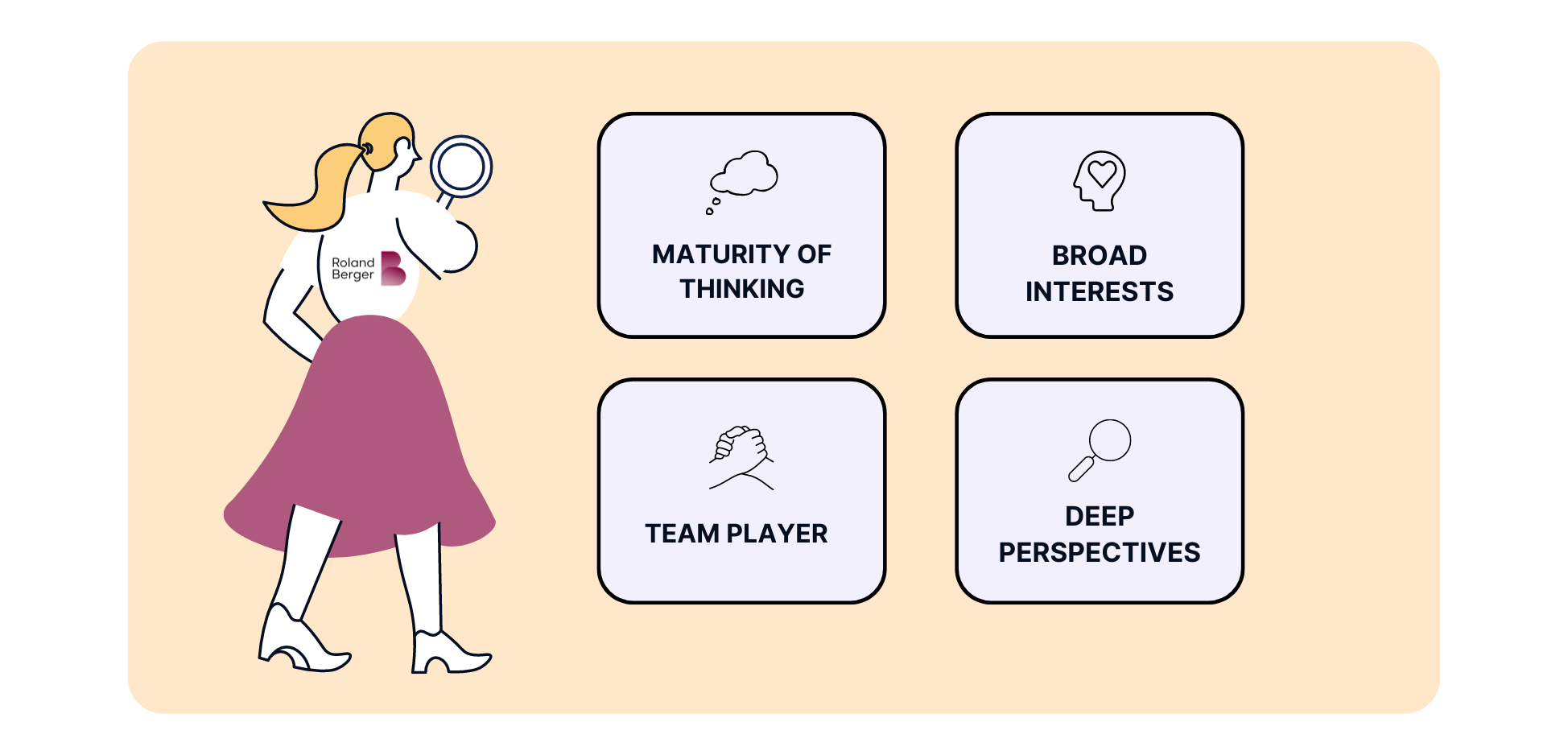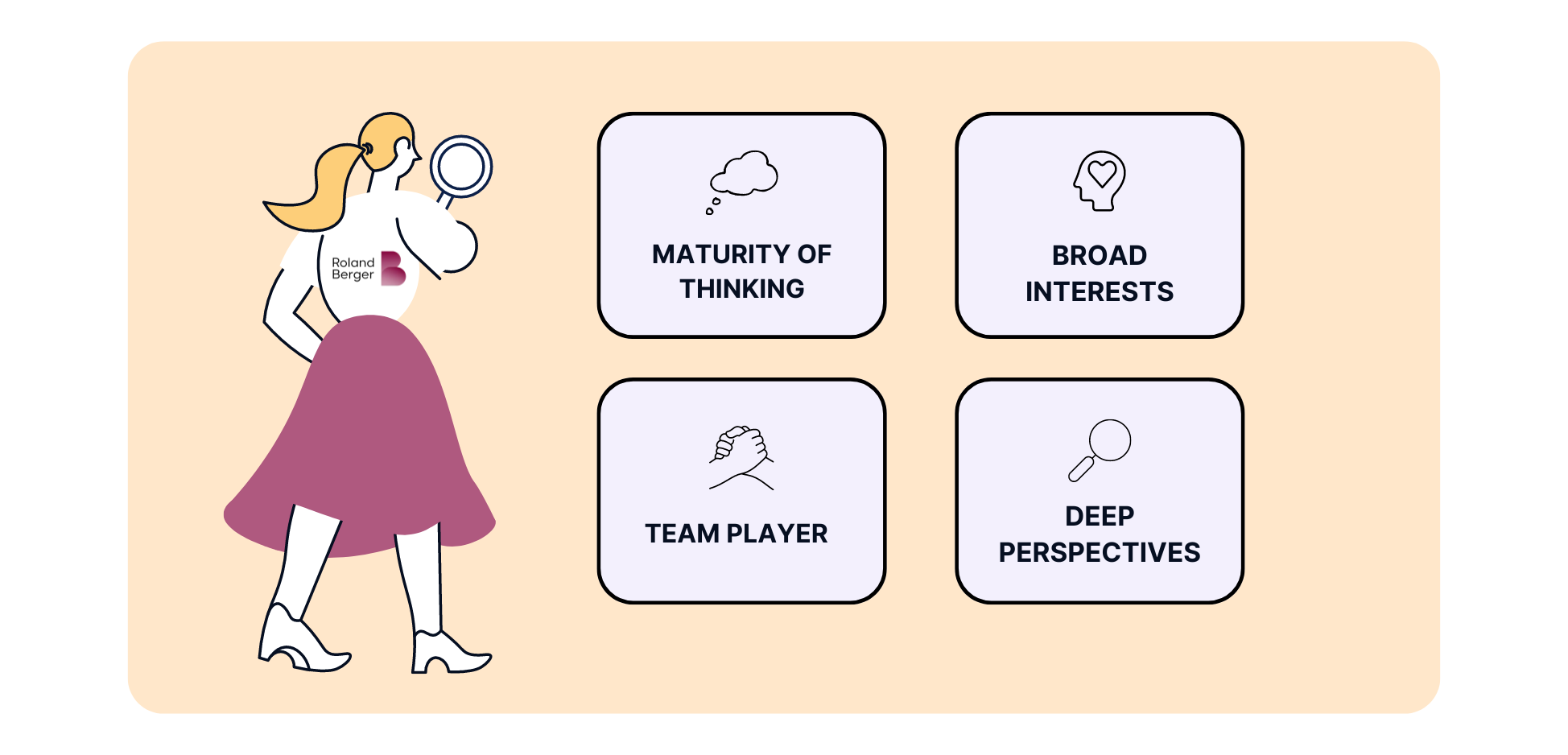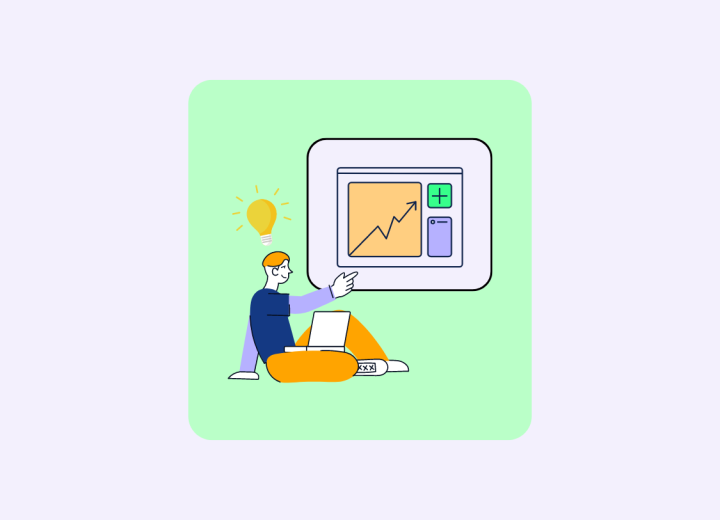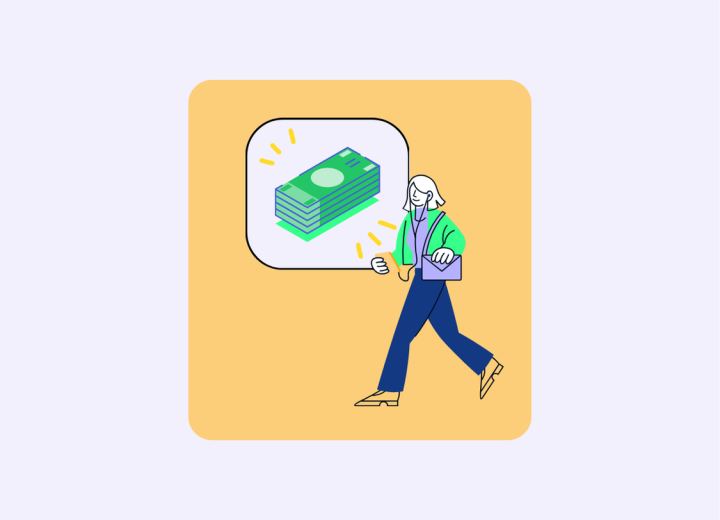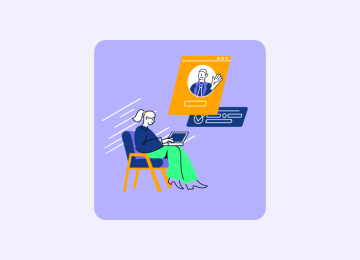Types of Interview
Roland Berger has three interview formats across their network: experience/fit, case questions, and a written case interview. Let's take a closer look! 🔎
Experience / Fit Interview
The experience questions are asked prior to beginning the case interview and Roland Berger will use questions such as:
- Why are you interested in Roland Berger?
- Why are you interested in consulting?
- What experience are you most proud of?
- What experience do you wish you could do over, and how would you do it differently?
- What is a difficult decision you have made in the last year?
- What is an example of a time when you showed initiative and leadership?
- What aspects of your internship did you like less?
- What do you most like to do in your free time?
- What attributes would you bring to a case team?
- Describe a role where you changed the direction of a team. How did you do it?
The key to these questions is to develop a structure that can be applied to them. By structuring your answer, you will show that even when discussing non-business-related topics you use a considered approach to your answer.
👉 Check out the Integrated FIT Guide from our expert Clara or practice with our stress question tool for your experience interview at Roland Berger.
Case Questions
The case interviews that Roland Berger uses are all based on real-life client examples. The interviewers are encouraged to use their own client engagements for their case interview questions because they know them well and will be able to provide data and context easily. This format is the most common interview format used by Roland Berger because it is the closest resemblance to the work required on the job and allows the interviewer to answer the question ‘Can this person do the work of a Roland Berger consultant?’
They assess candidates over a number of different attributes during a case interview:
👉 Scoring well across all these attributes will result in being progressed to the next stage or ultimately, a job offer. For further information on how to demonstrate these skills see our complete case interview guide here.
Written Case Interview
The Roland Berger structured case interview is similar to the written cases provided at BCG and Bain. The candidate is given an information pack of 15-20 pages and 10 minutes to read the pack with three high-level questions they want to be answered. The interviewer will leave the room during the 10 minutes of reading time.
As with the case interview, there is not a correct answer and the important part of your answer is the consideration of trade-offs for making decisions and comparing the possible strategic decisions the business in question can take. The interviewer will test your thinking and recommendations to see how robust your conclusions are and the steps you took to get there.
The Case Interview
The consulting case interview is the cornerstone of every strategy consulting firm’s interview process due to the ability to replicate the problems and challenges of the work they do.
To score well in a Roland Berger case interview, you must meet the criteria laid out above and you can do this following a structured approach to case interviews. The structure of a Roland Berger case interview is as follows:
- Situation and problem
- Hypothesis validation
- Framework development
- Root cause analysis
- Mathematical calculation (sometimes)
- Creativity test (sometimes)
- Recommendation
At the start of the case, the interviewer will outline the context and the problem to be explored.
An example might be: “A high street retailer wants to cut costs by 30% in response to the Covid-19 pandemic, how would you approach this?”
You would then be expected to put forward an initial hypothesis on what the answer might be and explain your intention to prove or disprove it.
From there you will be expected to develop a framework to conduct your analysis and test it with the interviewer.
If your framework is MECE and you explore it correctly, then you will find the root cause of the issue for the client (in this case where costs can be reduced) and begin calculations if relevant.
The creativity test is when the interviewer asks you for an alternative to your findings or recommendation e.g. “Okay, the client says they do not want to shut stores, how else can they reduce cost?” They may ask this more than once and test the candidates' ability to think of alternatives, even if their answer is appropriate.
Finally, you will be asked to provide a recommendation whereby you need to synthesize your findings and give a clear and concise proposal.
👉 Read our complete guide here for more information on how to approach and solve case interviews.
Additional Tips
1️⃣ Fast Maths
Case interviews are pressurized situations where your anxiety levels are heightened and you don’t have the safety net of notes or the internet to fall back on.
For in-person interviews, it is common that one of the questions will have a mathematical element or be a market sizing question included. These require long maths calculations without a calculator. If you haven’t practiced long addition, multiplication, division, or subtraction recently then it is a good idea to do so. Being quick at maths shows your competent quantitative skills and reduces unnecessary pressure during the interview, increasing your overall performance.
👉 Check out our Mental Math tool.
2️⃣ Practice
As with maths, practicing case interviews is the best way to improve your performance. Through practice, you will begin to develop a robust approach that satisfies the structure and framework components of the case and you will recognize how to navigate the case successfully.
If you are applying to Roland Berger, you are probably applying to other strategy consulting firms, too. This practice will be relevant to all of the firms you apply to as they all use case interviews in their application process.
👉 You will find many cases for preparation on PrepLounge and can schedule mock interviews with peers on our meeting board here.
3️⃣ Apply Structure to Everything
The critical requirement of a candidate in a case interview is the application of structure, specifically with a MECE approach. As mentioned above, you can even apply structure to the fit questions and it is recommended you do so.
An example answer to the question ‘walk me through your CV’ would be to segment your experience into
- Experience relevant to consulting
- Experience not relevant to consulting
and then briefly cover the experience you have in each bucket.
This shows you understand what consulting is and what is relevant and also a key skill of a consultant – structured thinking.
You will score highly if you can demonstrate robust structured thinking in your interview.
Final Thoughts
The case interview at Roland Berger may seem challenging at first, but with the right preparation and practice, you can succeed. It's important to demonstrate structured thinking, analytical skills, and creativity to solve complex problems.
Don’t get discouraged—thorough preparation, including mental math exercises and regular case practice, will enable you to showcase your abilities. You've got this! Best of luck! 🍀
